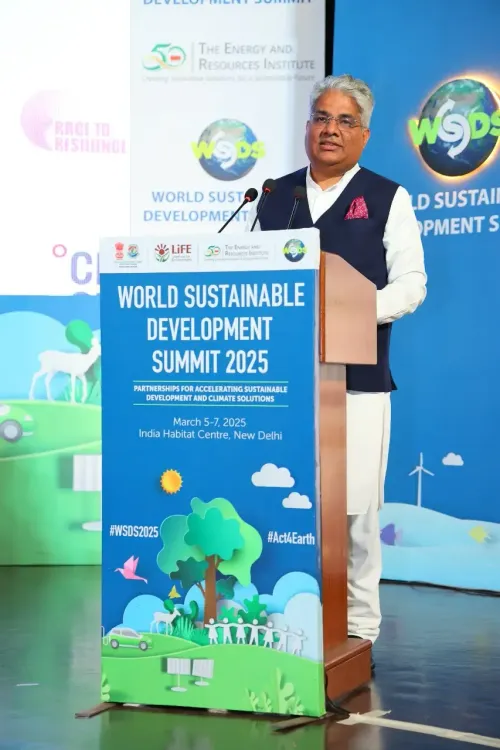India: A Leading Force in Global Climate Action - Bhupender Yadav

Synopsis
Key Takeaways
- India reduced GHG emissions by 7.93% in 2020.
- Global South is crucial in climate discussions.
- India's initiatives include ISA, CDRI, and LiFE.
- Call for developed nations to meet Paris Agreement commitments.
- India aims for net-zero emissions by 2070.
New Delhi, March 7 (NationPress) The world now looks to India as a trailblazer in climate initiatives, stated Union Minister for Environment, Forest and Climate Change Bhupender Yadav.
During his address at the World Sustainable Development Summit 2025, he highlighted that in 2020, India managed to decrease its greenhouse gas (GHG) emissions by 7.93 percent, which serves as a clear indicator of India's dedication to climate efforts.
He pointed out that the Global South, including India, plays a vital role in influencing climate discussions, as it bears the brunt of climate change's effects while also presenting solutions grounded in sustainable development.
“The Global South is at the forefront of the climate agenda, and the world is now looking to India as a leader,” Yadav remarked, urging for heightened collaboration, ambition, and action on a global scale.
He reiterated India's dedication to global sustainability through initiatives such as the International Solar Alliance (ISA), Coalition for Disaster Resilient Infrastructure (CDRI), and Mission Lifestyle for Environment (LiFE).
“India's position as a global climate leader is focused on ensuring that climate action remains inclusive, ambitious, and collaborative,” stated Yadav.
The Union Minister urged developed nations to uphold their financial and technological commitments, particularly in meeting their responsibilities under the Paris Agreement.
He emphasized the importance of enhanced global cooperation in fortifying Nationally Determined Contributions (NDCs), ensuring they effectively tackle both the challenges and opportunities of climate action.
Addressing the urgent necessity for increased climate adaptation funding, Yadav stressed the critical need to bolster adaptation efforts in response to escalating climate impacts.
He advocated for stronger financial assistance for adaptation, ensuring that the most vulnerable areas can deploy solutions that enhance resilience and protect livelihoods.
Describing India's long-term vision of becoming a Viksit Bharat by 2047, Yadav indicated that the nation aims to achieve net-zero emissions by 2070.
Highlighting India's advancements, he noted a 36 percent reduction in emission intensity of Gross Domestic Product (GDP) from 2005 to 2020, compared to a 45 percent target for 2030.
He called for strong global partnerships to address intertwined challenges like poverty, inequality, and environmental degradation.










